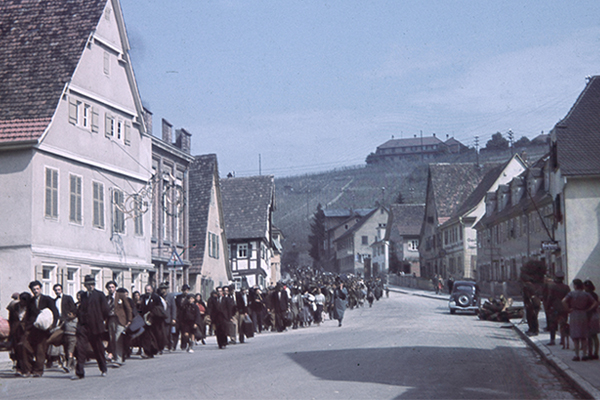
German police supervise the deportation of Sinti and Roma people, while onlookers watch from the other side of the road, Asperg, Germany, May 1940. Courtesy of Bundesarchiv, R 165 Bild-244-42/photographer: unknown
2023 Monna and Otto Weinmann Annual Lecture
7 p.m. ET | 4 p.m. PT
Opening remarks
Dr. Janice Weinman Shorenstein, CEO, Education through Music
Speaker
Dr. Ari Joskowicz, Chair of Jewish Studies; Associate Professor of Jewish Studies and European Studies; Associate Professor of History, Vanderbilt University
Moderator
Dr. Lisa M. Leff, Director, Jack, Joseph and Morton Mandel Center for Advanced Holocaust Studies, United States Holocaust Memorial Museum
This virtual program is free and open to the public, but registration is required.
Register to receive a link to view the program.
For more information, please contact Katharine White at 202.314.0395 or kwhite@ushmm.org.
The Monna and Otto Weinmann Annual Lecture honors Holocaust survivors and their fates, experiences, and accomplishments. Monna Steinbach Weinmann (1906–1991), born in Poland and raised in Austria, fled to England in autumn 1938. Otto Weinmann (1903–1993), born in Vienna and raised in Czechoslovakia, served in the Czechoslovak, French, and British armies; was wounded at Normandy; and received the Croix de Guerre for his valiant contributions during the war. Monna Steinbach and Otto Weinmann married in London in 1941 and immigrated to the United States in 1948.
This annual lecture has been made possible by Janice Weinman Shorenstein.
The Jack, Joseph, and Morton Mandel Center’s mission is to ensure the long-term growth and vitality of Holocaust studies. To do that, it is essential to provide opportunities for new generations of scholars. The vitality and the integrity of Holocaust studies require openness, independence, and free inquiry so that new ideas are generated and tested through peer review and public debate. The opinions of scholars expressed before, during the course of, or after their activities with the Mandel Center do not represent and are not endorsed by the Museum or its Mandel Center.
